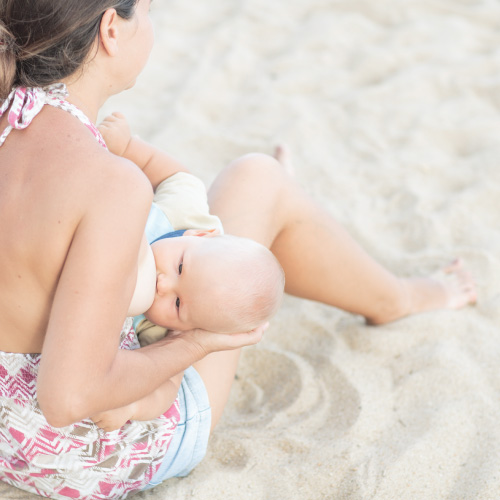Newborn and Infant Dehydration

One of the concerns parents have when I help them transition their baby from being feed in quick succession, so every one, two or three hours (within 3 ½ hours) is whether their baby will become dehydrated from feeding less often. While many parents are taught that dehydration can happen quickly for newborns and infants compared to an adult, I feel that this factual statement often lacks the depth of knowledge about how and why dehydration can happen, leaving some parents worrying unnecessarily. Hence I thought I would write this article to allay possible concerns. So let’s start with the basics.
What is dehydration?
Dehydration occurs when there is a lack of water in the body, which is lost every day through urine, sweat, stools and breathing. When our bodies do not have adequate water it cannot function properly because of the loss of electrolytes.
What are the causes for newborns and infants?
For a newborn this can result from a mother unknowingly having a low to no supply. Fever and diarrhoea are the other two main causes of dehydration both for newborns and infants and these are usually caused by some kind of gastroenteritis (stomach bug).
Hot weather is also associated with dehydration for newborns and infants and many say that a baby needs to be fed more often during this kind of weather. However, as long as your baby is wearing appropriate cloths for the conditions and is feeding well from you at each feed, fed every three-and-a-half to four hourly (my recommendation to help a baby’s digestive system function naturally) then they should remain well hydrated. There is no need to feed more often in this circumstance.
The main cause of dehydration and the time of major concern is when your baby or infant has a fever, is vomiting and/or has diarrhoea, which are generally caused by some of kind of gastroenteritis (stomach bug). To see what to do in these circumstances keep reading.
Symptoms of dehydration 1
- Child is tired, restless and irritable (making it difficult to re-hydrate by drinking fluids)
- Child is increasingly thirsty
- Child has a dry mouth and tongue
- Child is not urinating as frequently or as much as normal
- Child experiences weight loss
- Child has slightly sunken eyes and/or a depressed fontanel (the soft spots on babies' heads)
- Child does not produce tears when crying
What you can do if you believe your baby is dehydrated?
According to Southern Cross New Zealand, "babies and infants that are dehydrated should not be given substantial amounts of water because this dilutes their already low levels of electrolytes and can lead to complications." They go on to say that "instead, they should be given diluted fruit juice or a re-hydration solution that are available from pharmacies. Feeding from a syringe or teaspoon at this stage can be helpful to."2 Personally, I believe in feeding breast milk or formula before fruit juice for our newborns and infants but given the electrolytes this may be why Southern Cross recommends fruit juice. They also say, "It is advisable to see your doctor early if dehydration is suspected in a young one, as it is often difficult to assess the hydration level accurately, and the condition may change very rapidly. Severe dehydration requires a hospital visit and fluids and electrolytes given through a vein, ie: intravenously, for rapid rehydration and recovery."2
Dr Ben Hoffman, the Medical Director of Tom Sargent Children’s Safety Centre and an Assistant Professor of Paediatrics at Doernbecher Children’s Hospital, recommends giving ‘a little bit of fluids at a time because if the child drinks to fast, vomiting is likely to occur’ when dehydration is caused by gastroenteritis. He recommends starting with 1 to 2 tablespoons of fluid every 5 to 15 minutes (2 tablespoons = 1 ounce). If that stays down then increase the amount.3
Always take your child to see the doctor or call an ambulance if you are really concerned. If in New Zealand you can also phone Healthline on 0800 611 116.
- http://www.businesswire.com/news/home/20100407005181/en/Survey-Reveals-Parents-Lack-Information-Dehydration-Treatment
- https://www.southerncross.co.nz/group/medical-library/Dehydration-signs-symptoms-prevention
- http://www.ohsu.edu/blogs/doernbecher/2013/01/09/when-kids-get-stomach-bugs-preventing-dehydration-is-priority-no-1/
- www.healthline.govt.nz
- http://www.aafp.org/afp/2009/101/p692.html - this is a useful link


